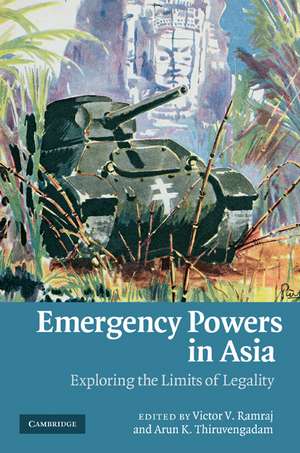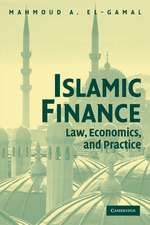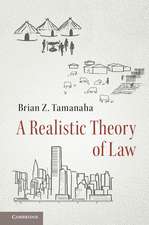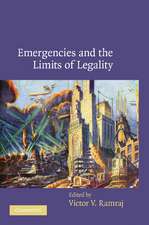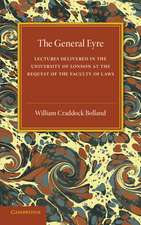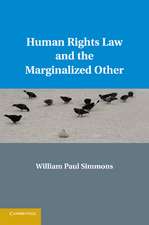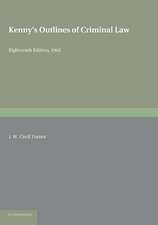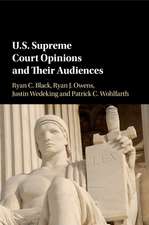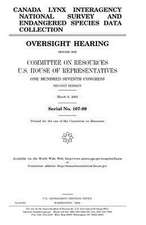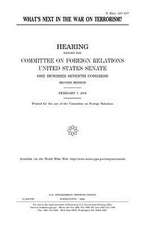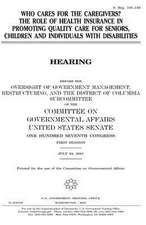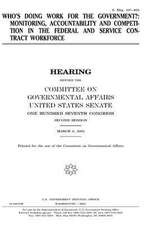Emergency Powers in Asia: Exploring the Limits of Legality
Editat de Victor V. Ramraj, Arun K. Thiruvengadamen Limba Engleză Hardback – 9 dec 2009
Preț: 616.44 lei
Preț vechi: 692.63 lei
-11% Nou
Puncte Express: 925
Preț estimativ în valută:
117.96€ • 123.41$ • 97.99£
117.96€ • 123.41$ • 97.99£
Carte tipărită la comandă
Livrare economică 02-16 aprilie
Preluare comenzi: 021 569.72.76
Specificații
ISBN-13: 9780521768900
ISBN-10: 052176890X
Pagini: 530
Dimensiuni: 158 x 234 x 30 mm
Greutate: 0.98 kg
Editura: Cambridge University Press
Colecția Cambridge University Press
Locul publicării:Cambridge, United Kingdom
ISBN-10: 052176890X
Pagini: 530
Dimensiuni: 158 x 234 x 30 mm
Greutate: 0.98 kg
Editura: Cambridge University Press
Colecția Cambridge University Press
Locul publicării:Cambridge, United Kingdom
Cuprins
1. Introduction: emergency powers and constitutionalism in Asia Victor V. Ramraj and Arun K. Thiruvengadam; Part I. Perspectives from Legal and Political Theory: 2. The emergency powers paradox Victor V. Ramraj; 3. Emergency powers, constitutionalism and legal transplants: the East Asian experience Albert H. Y. Chen; 4. Constitution and 'extraconstitution': colonial emergency regimes in postcolonial India and Pakistan Anil Kalhan; 5. The princely imposter: stories of law and pathology in the exercise of emergency powers Vasuki Nesiah; Part II. Postcolonial and Post-Conflict Transitions: 6. From Myanmar to Manila: a brief study of emergency powers in Southeast Asia Kevin Y. L. Tan; 7. Discourses of emergency in colonial and post-colonial Burma Maitrii Aung-Thwin; 8. Emergency and Islamic law in Aceh Michelle Ann Miller and R. Michael Feener; 9. UNaccountable? The United Nations, emergency powers and the rule of law in Asia Simon Chesterman; Part III. Emergencies, Executive Power and Constitutional Order: 10. Emergency powers and the rule of law in Indonesia Nadirsyah Hosen; 11. Emergency powers with a moustache: special powers, military rule and evolving constitutionalism in Thailand Andrew Harding; 12. Emergency powers and the limits of constitutional rule in Japan Mark Fenwick; 13. States of exception in an exceptional state: emergency powers and law in China Jacques deLisle; Part IV. The Role of the Courts: 14. Constitutionalised emergency powers: a plague on constitutionalism? H. P. Lee; 15. Political emergencies in the Philippines: changing labels and the unchanging need for legitimacy Raul Pangalangan; 16. Islamism as a response to emergency rule in Pakistan: the surprising proposal of Justice A. R. Cornelius Clark B. Lombardi; 17. Asian judiciaries and emergency powers: reasons for optimism? Arun K. Thiruvengadam.
Recenzii
'While emergency powers are most frequently resorted to in Asia, there is little systematic or comprehensive study of this phenomenon. Emergency powers can be a threat to liberal constitutionalism; it may also be a measure to restore stability and constitutional order. It may be an instrument of suppression, and yet in some circumstances, it may also serve to galvanize public support against authoritarian regimes. The role of emergency powers in liberal constitutional democracies, through which emergency powers are conventionally analyzed, is very different from that in developing countries, particularly in the transition from colonial rule to independence, or from political turbulence to relative tranquility. Can emergency powers be contained by the constitution, and more fundamentally, can constitutionalism be sustained and evolved alongside real, exaggerated or perceived emergency situations with a relatively fragile judiciary in many Asian states? This book provides a fresh perspective in understanding emergency powers by putting them squarely in the post-colonial and post-conflict social, legal, political and comparative context in Asia, thereby enabling an intellectual and theoretical engagement of the contemporary debates on this complex yet fascinating subject.' Johannes Chan S. C., University of Hong Kong
'Drawing on impressive presentations of factual material and offering provocative theoretical insights, the essays here make an important contribution to our understanding of the constitutional regulation of emergency powers, one of the central questions in constitutional law and theory in today's world.' Mark Tushnet, Harvard Law School
'The role of emergency provisions in the constitutional order has generated a good deal of attention recently, but too often, the analysis is either abstract or focused on a single jurisdiction. Ramraj and Thiruvengadam have produced a wonderful comparative collection on the use and misuse of emergency powers in Asia. With its wide range of political regimes, constitutional traditions, and security challenges, Asia offers a fruitful environment to examine how policy makers and judges have grappled with emergencies, both real and imagined. Theoretically informed, empirically rich and conceptually nuanced, this volume is a major contribution to the ongoing debates on constitutionalism and security, and should be read throughout the region and beyond.' Tom Ginsburg, University of Chicago Law School
'Drawing on impressive presentations of factual material and offering provocative theoretical insights, the essays here make an important contribution to our understanding of the constitutional regulation of emergency powers, one of the central questions in constitutional law and theory in today's world.' Mark Tushnet, Harvard Law School
'The role of emergency provisions in the constitutional order has generated a good deal of attention recently, but too often, the analysis is either abstract or focused on a single jurisdiction. Ramraj and Thiruvengadam have produced a wonderful comparative collection on the use and misuse of emergency powers in Asia. With its wide range of political regimes, constitutional traditions, and security challenges, Asia offers a fruitful environment to examine how policy makers and judges have grappled with emergencies, both real and imagined. Theoretically informed, empirically rich and conceptually nuanced, this volume is a major contribution to the ongoing debates on constitutionalism and security, and should be read throughout the region and beyond.' Tom Ginsburg, University of Chicago Law School
Descriere
What role does, and should, legal, political, and constitutional norms play in constraining emergency powers, in Asia and beyond.
